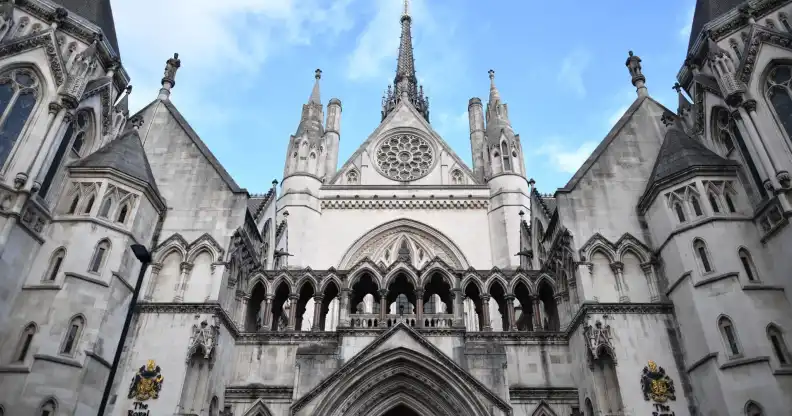Gay asylum seeker who fled to the UK aged 15 after family threatened to kill him ordered by court to return to Algeria

The Royal Courts of Justice where the High Court is located in London. (Getty/ BEN STANSALL/AFP)
A young gay asylum seeker who arrived in the UK as a teenager after being threatened with death by homophobic family members has been told by a court that he must return to Algeria because could easily “survive” there.
On Monday (14 December), the Court of Appeal dismissed the man’s asylum and human rights appeal, forcing him back to Algeria where being gay is illegal.
The man, identified only as YD, arrived in the UK at 15 years old. Both of his parents died in a car crash when he was a young child, and because of a difficult relationship with his uncle, he was kicked out and left homeless at 12 years old.
When he was 13, he was discovered in bed with his 14-year-old boyfriend. When his uncle found out, he was left homeless again, and was told through his cousin that if he returned home his uncle would kill him.
YD arrived in the UK via Spain, and claimed asylum based on risk of return to Algeria because he is gay. His asylum claim was rejected by the Home Office, although he was given discretionary leave to remain for one year.
When he applied for further leave to remain this was also rejected, and he appealed to the first-tier tribunal.
According to court documents: “In the witness statement prepared for the tribunal hearing, he said that he believed that his uncle would find him and kill him if he were returned to Algeria. He said that he would not be accepted in Algeria.
“He had lived for four years in the United Kingdom and he felt good about himself and did not feel ashamed about his sexuality.
“He said people in the United Kingdom were very open-minded and he did not have to worry about his behaviour or how people viewed him.
“The situation would be very different in Algeria and he did not think he would be able to cope with that. He would be rejected by society, mistreated and abused, and did not believe the police would protect him.”
But his appeals, both to the first-tier and upper tribunals, and this week to the court of appeal, were all shot down and it was decided that there were “no significant obstacles to the appellant’s re-integration in Algeria”.
“The tribunal carefully assessed the evidence and found that it was not established that gay people in Algeria would be subjected to any harm of sufficient intensity and duration capable of amounting to persecution,” it added.
Despite the court’s claim that there is “no reliable evidence to establish a risk of targeted or arbitrary attacks on gay men or abusive treatment by police”, just three months ago a court in the North African country sent two men immediately to prison and sentenced 42 other people to suspended prison sentences for being at a “gay wedding”.
The court of appeal also ruled that gay men in Algeria were only at risk of violence at the hands of their family members, but last year an Algerian medical student was murdered in his room when two unknown assailants slit his throat and smeared “gay” on the wall in his blood.

